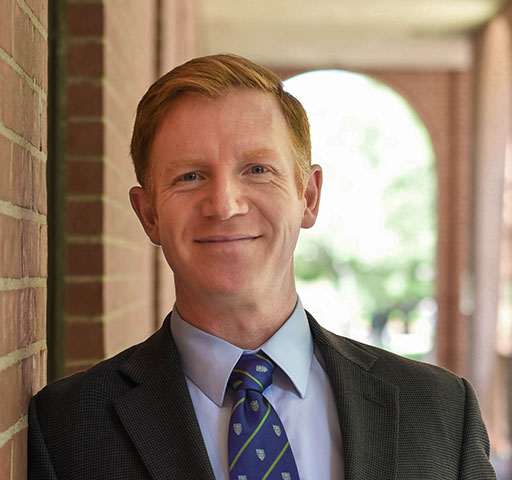Peter Campbell
Associate Professor of Political Science

Education
Ph.D. Political Science, University of Notre Dame
M.A., War Studies, King’s College London, United Kingdom
B.A.H., Philosophy, University of Winnipeg, Canada
Peter Campbell studies international security, civil-military relations, strategy, international relations scholarship and policy relevance, insurgency and counterinsurgency, the just war tradition, military culture, and cyber warfare.
Publications and Works in Progress
Book: “Military Realism: The Logic and Limits of Force and Innovation in the US Army,” University of Missouri Press, 2019.
Journal Article: “Generals in Cyberspace: Military Insights for Defending Cyberspace” Orbis: The Journal of the Foreign Policy Research Institute, Spring 2018.
Journal Article: “Military Realism and Doctrinal Innovation in Kennedy’s Army: A New Perspective on Military Innovation.” Journal of Global Security Studies, a peer-reviewed international security journal. In Press.
Journal Article: “Military Autonomy: Its Origins, Implications, and the Politico-Military Dialectic of War.” Defence Studies Vol. 19, No. 3 (Sept. 2019).
Journal Article: Co-author Dr. Richard Jordan, “Forming the Grand Strategist According to Shakespeare,” Texas National Security Review, Vol 3, No. 1 (Winter 2019/2020), pp. 12–33.
Public Lecture: “Statecraft and Cyberspace: Is the Best Cyber-Defense a Good Cyber-Offense?” Abstract: Recently there have been calls for the U.S. to unleash the cyber offense. Advocates contend that offense has the advantage in cyberspace. However, these advocates do not appreciate the dangers of an offensive cyber strategy, and underestimate the advantages of cyber-defense. In fact, defensive cyber tactics and strategy have clear advantages over offensive ones. I argue that insights about the power of the defense, long appreciated by strategists and tacticians of conventional warfare, apply in cyberspace. I have found substantial evidence that cyber defenders are coming to realize this after initial advocacy of the cyber-offense. These insights can be the source of still further advances in the cyber-defense and a reduction in reliance on cyber-offense, which I argue has dangerous consequences for the national security and foreign policy of the United States and its allies. These defensive insights can help the US develop a defensive cyber strategy. Such a strategy will attract national and private sector actors to the U.S. as the defenders of a mutually beneficial cyber-status quo.
Blog Post: Campbell, Peter, “The Army Innovates Better Than You Think: A Guide to Thinking About Multi-Domain Operations and Fighting Future Wars,” May 24, 2019. Blog post published online by the Modern War Institute at West Point Military Academy. https://mwi.usma.edu/army-innovates-better-think-guide-thinking-multi-domain-operations-fighting-future-wars/
Journal Article: Campbell, Peter; Peh, Kimberley & Graham, Jeremy, “Women in Political Science: New Data on Gender in the Discipline.” Draft undergoing revision.
Book: Campbell, Peter, Farewell to the Marshal Statesman: The Decline of Military Experience Among Politicians and its Consequences. Research and writing in progress.
Campbell, Peter and Desch, Michael C., “Rank Irrelevance: How Academia Lost its Way,” Foreign Affairs.com, Sept. 15, 2013, http://www.foreignaffairs.com/articles/139925/peter-campbell-and-michael-c-desch/rank-irrelevance. See data at http://www3.nd.edu/~carnrank/ . Authors took part in the roundtable “Carnegie Corporation of New York-Initiatives to Bridge the Academe/Policy Divide” at the ISA ISSS ISAC Joint Annual Conference 2013, Washington, D.C.
Assistant Project Manager, “Beyond the “Cult of the Irrelevant:” Next Steps for Reconnecting Academic Political Science and National Security Policymaking.” Research project funded by the Carnegie Corporation of New York. Principle Investigator: Dr. Michael Desch, University of Notre Dame. Assistant Project Managers: Dr. Paul Avey, Virginia Tech and Dr. Peter Campbell, Baylor University.
Courses at Baylor
PSC 3315 Fundamentals of International Politics
Theories of international politics will be examined and compared in the light of the evolution of the modern states system. Attention will be given to the factors and variables that affect the formulation and implementation of foreign policies.
PSC 3355 Causes of War
The causes of warfare as viewed through the lenses of human evolution, psychological approaches, economic system, ideology, and the international system.
PSC 4346 Intelligence and Covert Action
This course provides students with the ability to evaluate the impact of intelligence, counterespionage, and covert action policies on national security policy and international relations.
PSC 4316 Grand Strategy
Grand strategy defines the interests of a state, the threats to those interests, and the policies and military forces needed to minimize the danger posed by those threats. This course examines grand strategies of great powers to determine the relationship between a great power's grand strategy and stability in international politics.
PSC 5335 Seminar in National Security Decision Making
Analysis of the components of national security strategy and those international and domestic factors that shape it. Seminar covers the process, factors, institutions, and issues in national security decision making.
PSC 5355 Development of Strategic Thought
This seminar will examine the ideas of strategic thinkers who lived in a variety of historical periods. Students will read works by major strategists including Thucydides, Sun Tzu, Machiavelli, and Clausewitz.
Course Design in Progress: “Insurgency and Counterinsurgency: History, Theory and Ethics.” An examination of different theories of insurgency and counterinsurgency and the history and ethical implication of their use.